Aeschylus at play
April 10, 2014
Oliver Thomas has just been representing Nottingham at a conference on Aeschylus’ satyr-plays at the University of California at Davis. Here he explains why satyr-plays are important for students of Greek tragedy. Already in Aristophanes’ Frogs (405 BCE), Aeschylus’ plays are caricatured as a dramatically unsophisticated torrent of weighty verbiage. Yet every tragedy Aeschylus wrote …
When Texts Are Things: the writing’s on the wall
March 23, 2014
It would be easy to think that new material in ancient literature was confined to a small number of very rare discoveries – but actually the evidence changes all the time. Here is just one small, unspectacular but nevertheless exciting example… When I last posted here, it was about the ‘New Sappho’, forthcoming in Zeitschrift …
Martial and first world problems
March 17, 2014
The first world problem meme might seem a relatively recent invention but the late first-century AD poet Martial was already playing with the idea. Some examples of #firstworldproblems: ‘Just got a splinter in my finger from an avocado stone. Guacamole injury.’ ‘No shiraz so had to use merlot in the beef bourguinon.’ featured here. More …
Love is a bourgeois construct: the view from Rome
March 7, 2014
A few weeks ago I asked if you believed in love: now I’m thinking about the ways that ideas of love affect the rest of life, and are implicated in class structures. The title of this post comes from a Pet Shop Boys song in which they refer to a David Lodge campus novel Nice …
(Ancient) Advice Column 1: The Football Fan
February 28, 2014
Esther Eidinow begins a new advice column: what should you do if your team has offended the gods? The subject line read ‘Question About Removing a Curse’. I teach a module on Ancient Greek magic and religion—but the sender was not one of my students. If this was a phishing attempt, it was novel. I …
Aristophanes in London
February 19, 2014
Last week saw the students of both UCL and KCL put on their annual Classical plays. That gave Oliver Thomas the opportunity to see two of Aristophanes’ comedies on the same day – UCL’s Clouds, performed in translation, and KCL’s Wasps, performed in Greek with English surtitles. Two productions of early Aristophanes plays, but two …
Song for whoever: Propertius and cultural relativism
February 14, 2014
Do you believe in love? I’m talking romantic love, ‘lurve’, roses, Valentine’s cards, love will make you real, love will make you whole, love will make everything OK, all-you-need-is-love. And why should reading love poetry written by a Roman in the first century BC make any difference? Surely that shows just how universal love is: …
New Sappho: not for Valentine’s Day!
February 12, 2014
So: new Sappho! Actually, there are two new Sappho papyri coming up; the one we know about has two fragments, but the most comprehensible is the one which its editor, Dirk Obbink, has called the ‘Brothers poem’, and that’s what I’ll talk about here. The best place to read about it, to see a (tidied …
Argonauts and hobbits
February 7, 2014
When I was reading The Hobbit with my son, I was repeatedly struck by how much Bilbo Baggins resembles Jason in Apollonius’ Argonautica. He is a reluctant hero, who doesn’t want to have an adventure. He is inveigled into it against his will. He suffers from repeated bouts of homesickness and a sense of helplessness. …
3D-Scanning Fundilia: Research on the statuary finds from the Sanctuary of Diana at Nemi
January 30, 2014
Can quantitative analysis give a new way of looking at art? By 3D-scanning Roman portraits, Katharina Lorenz aims to answer this question. In the summer of 2013, the Nottingham Castle Museum and Galleries put on an exhibition of the finds from the Roman Sanctuary of Diana at Nemi. The collection is now back in the …

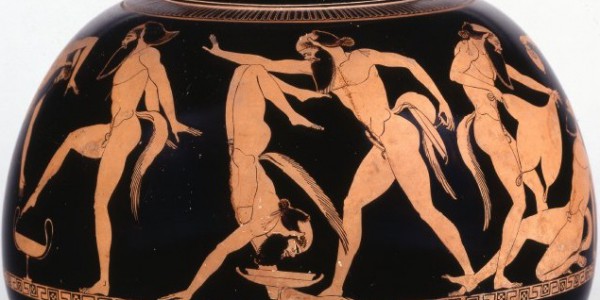
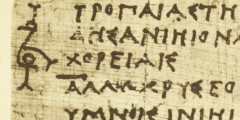



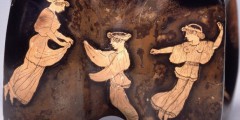
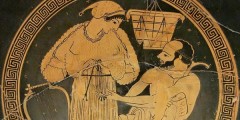
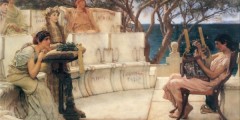

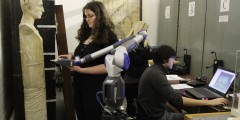
Recent Comments